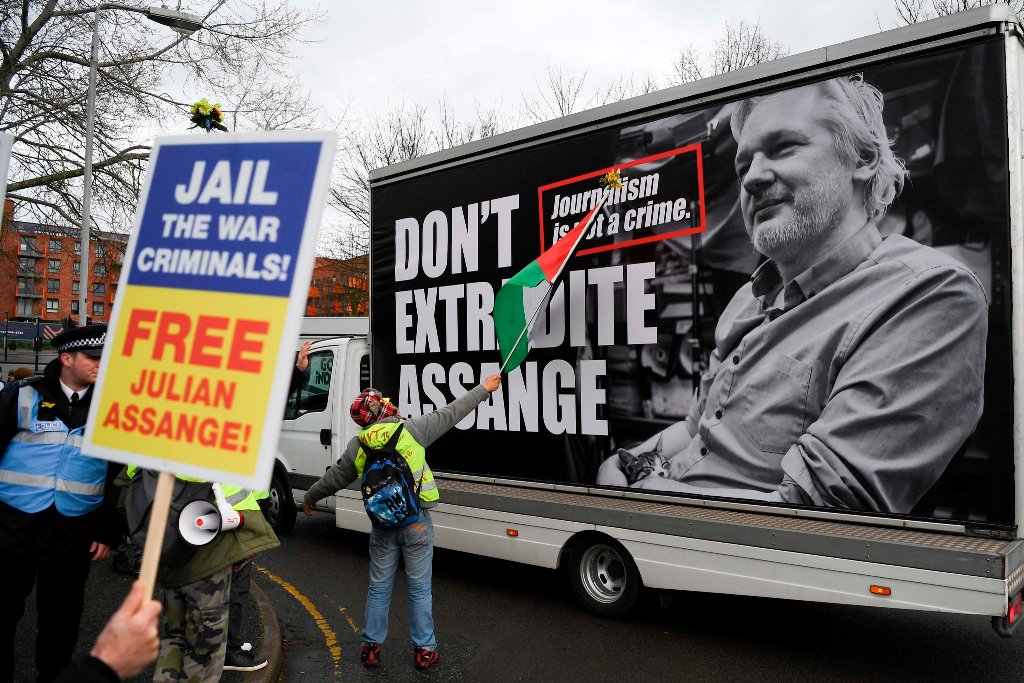Former British ambassador to Uzbekistan reported from inside the courtroom hearing about Julian Assange’s extradition wrote, “I followed the arguments very clearly every minute of the day, and not a single one of the most important facts and arguments today has been reported anywhere in the mainstream media… The mere act of being an honest witness is suddenly extremely important, when the entire media has abandoned that role.” The courtroom itself is in a notorious high security prison in London, with only sixteen available seats in the public gallery.
The prosecution lawyer opened with an explicit address to the media, which is normally not allowed in a British court, stating that Assange’s charges could not apply to the media for publishing the American documents leaked by Bradley Manning, which he then contradicted when he forced to concede that the 1989 British Official Secrets Act would in fact make them liable. However, what was actually reported by the mainstream media was the text of the prosecution address on “why the prosecution of Assange is not a threat to press freedom; but nobody seems to have reported that he totally abandoned his own argument five minutes later.”
On the second day of the hearing, the defence lawyers told the court that Assange had had all of his papers confiscated by the prison authorities, making it impossible for him to prepare and participate in his own trial. The judge refused to consider the issue or even to speak to the prison authorities, which even the prosecution told her would be normal practice.
For the defence, Mark Summers QC stated that the USA charges were entirely dependent on three factual accusations of Assange’s behavior:
1) Assange helped Manning to decode a hash key to access classified material.
Summers stated this was a provably false allegation from the evidence of the Manning court-martial.
2) Assange solicited the material from Manning
Summers stated this was provably wrong from information available to the public
3) Assange knowingly put lives at risk
Summers stated this was provably wrong both from publicly available information and from specific involvement of the US government.
In summary, Summers stated the US government knew that the allegations being made were false as to fact, and they were demonstrably made in bad faith. This was therefore an abuse of process which should lead to dismissal of the extradition request. He described the above three counts as “rubbish, rubbish and rubbish”.
The judge told Summers that he had presented the findings of the US court martial of Manning as fact. But she did not agree that her court had to treat evidence at a US court martial, even agreed or uncontested evidence or prosecution evidence, as fact. Summers replied that agreed evidence or prosecution evidence at the US court martial clearly was agreed by the US government as fact, and what was at issue at the moment was whether the US government was charging contrary to the facts it knew.
To refute the charge that Assange was putting lives at risk, the defence pointed out that the US government had been actively participating in the redaction exercise on the cables, and that the Manning court martial had accepted these materials contained no endangered source names. They therefore knew the allegations of reckless publication to be untrue.
The judge then declared that although Article 4.1 of the US/UK Extradition Treaty forbade political extraditions, this was only in the Treaty. That exemption does not appear in the UK Extradition Act. On the face of it, therefore, political extradition is not illegal in the UK, as the Treaty has no legal force on the Court.
No one should have any doubt that the British and American governments, along with their judiciary care nothing for human rights, political freedoms or freedom of speech, especially when it goes against the interests of the self-appointed privileged elite.
Yahya Nisbet
Media Representative of Hizb ut Tahrir in Britain

